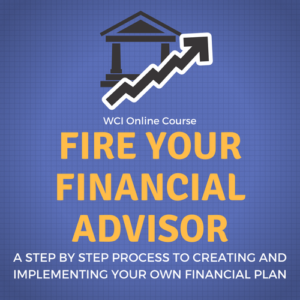(Only a few days left to sign up for the upcoming Marriage and Money MD Conference November 15-17. Attendance is free, but registration is required. There will be 20 CME credits available. You don’t want to miss my two discussions: Your Spouse is Your Greatest Financial Asset, and Divorce Proofing Your Marriage. The second lecture will be accessible to those who sign up for the VIP package. The VIP Package includes a daily live Q&A session with that day’s speakers, lifetime access to the recordings, 8 hours of bonus interviews, and more, and it’s only $99 if purchased before the conference starts.)
I came to the conclusion in the late 1990s that it was not worthwhile to invest in individual stocks. Not only could I not beat the market (neither can you), but it wasted a lot of my time. I have only purchased mutual funds since learning this lesson.
When I was buying stocks I watched the market daily, looking for the right time to buy. Then, after I bought an individual stock, I would watch it grow, trying to figure out the right time to sell. Sometimes, however, I would watch it drop. One even disappeared from the market and was a total loss.
Since I no longer purchase individual stocks, I have saved a lot of time over the years not watching my stocks rise and fall. I don’t even think about stocks or the stock market any longer, because I now buy mutual fund shares with the intent to hold them for the rest of my life and sell them only if I need the money in my retirement.
Recently, I had a slight change of heart. Two special opportunities came up that I just didn’t want to pass up. So in 2021, I not only purchased an individual stock, but I bought two of them. To top it off, they were also IPOs (Initial Public Offerings). Some would say that is two wrongs that don’t make a right. So let me tell you what I bought, why I broke my rules, and what I learned in the process.
The first stock I bought was Doximity (DOCS). Doximity is a company who aims to make life better for physicians. They produce communication products for physicians and provide a platform for us to all speak with each other and connect to our long lost medical school classmates. About 80% of American physicians are part of Doximity.
I spent a year writing articles for the op-ed section of their website. While I was writing for them, I visited their headquarters in San Francisco and met some of the employees and upper management. I liked what I saw. At the end of the year, my writing pay included some stock options to exercise if they ever went public.
This year, when they announced they were going to go public, I felt I wanted to jump in on this opportunity. Doximity has been doing well as a privately held company and I thought it would do well as a public offering also. It sounded like a multi-faceted winner to me: Providing assistance to physicians, earning money and something I could hold for the long haul and maybe even pass on to my kids.
I was given a chance to buy a small amount of the stock during the initial public offering at the opening price, so I decided to invest in the number of shares I was allotted plus my stock options. It was not enough stock to move the needle in my portfolio, but exercising my stock options meant I could own a small part of a company that has helped me as well.
Each time Doximity publishes an article of mine on their website, it creates a spike in my readership, new people sign up for my blog and more of my books are sold. Being a part owner of such an enterprise seemed like a good place for me to invest.
The second IPO I purchased was Dutch Brothers Coffee (BROS). This company was founded in Grants Pass, Oregon, where I live. They started as a single espresso pushcart and have grown to over 400 locations in nine states. The owners have been very generous with their good fortune and prosperity over the years and my family has had some direct benefit.
My kids play soccer in the fields they have built, both indoor and outdoor. Some of their friends work for the company and have nothing but good things to say about them. The founders of this company have become pillars in our community.
I am not a coffee connoisseur, but I decided to support this company for all the good they have done for our community. So now I own some of their stock as well.
Owning both of these companies has already more than doubled my investment, but that doesn’t mean much at this point. I feel good owning a part of companies that have also been a direct part of my life and look to be a solid investment into the future. If their stock value drops to nothing, I won’t have lost enough to matter.
The interesting thing I did notice was how my behavior changed, even with such a small investment. It has been a very long time since I had followed the stock market. Since all my purchases are for life, I don’t bother looking at the market except to update my net worth each quarter. Even then I don’t actually look at the market, I only record the quarter’s ending balance in each of my accounts.
My IRA account, for example, holds several different investments. I don’t check each one individually, I simply record the balance of my IRA account. Generally it is growing. Sometimes it takes a dip.
Years ago, when I owned individual stocks, I found myself checking stock prices every day. My spirit was up when the prices went up and I was bummed when the prices declined. This daily stock check in was an unexpected change in my behavior. I didn’t see that coming.
It didn’t make any sense for me to check the prices daily, since I was not going to act on the information. I was not going to buy more stock if the price dipped and I wasn’t going to sell any if the price jumped. So why was I looking? It was the thrill of it. I developed a good understanding of what people mean when they say they buy individual stocks because it is fun to play the market. Even knowing they are not beating the market doesn’t take away from that feeling. It is simply knowing that they might beet the market that drives them.
It is the same feeling one gets when gambling. We know we will not beat the house, but once in a blue moon someone does, and today it might be us. So we lay the money down and take our chances.
It took a few months for this new behavior to wear off, and now I no longer waste a little bit of my time each day looking at the market. Once in a while I will ask my son how they are doing, since he also jumped in on these two stocks when they went public. And to be honest, I occasionally peek at the prices, as I did when I started this story.
Unless some extenuating circumstances come up again, I don’t intend to become an individual stock picker. I plan to stick with what I now own and any new money will go into broad market index funds. I do like the safety and the assurance that I am betting on the most likely way for the long term outcome to be in my favor. I know it is a bit boring, and my return will only yield about 10%, but that is how good investing works. It is boring. It is the gambling that creates the excitement. Chasing that rush can also get me into trouble.
Moving forward I’ll continue to hold mutual funds in my retirement accounts and real estate outside of my retirement accounts. You can read all about my real estate journey in The Doctors Guide to Real Estate Investing for Busy Professional (Who Don’t Think Real Estate is for Them). My real estate investing is the chief reason I was able to retire in my 50s. If you want to read about how my real estate has totally blown my stock market investments out of the water, check out my article Who Wins: Real Estate or the Stock Market? A Real Life Contest.
I wish you many happy returns with your investing, whatever it looks like.










Sounds like you believe in how these 2 companies are managed and are interested in how these companies are running rather than just their stock price. Bravo!